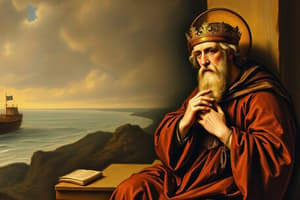Podcast
Questions and Answers
Who was Saint Augustine?
Who was Saint Augustine?
A philosopher and theologian, Bishop of Hippo.
Saint Augustine was born in Tagaste, Algeria.
Saint Augustine was born in Tagaste, Algeria.
True (A)
What concept did Augustine frame?
What concept did Augustine frame?
- Just War (correct)
- Original Sin (correct)
- Grace
- Papal Authority
What was the title of Augustine's work often referred to as the first Western autobiography?
What was the title of Augustine's work often referred to as the first Western autobiography?
What age was Augustine at the time of his baptism?
What age was Augustine at the time of his baptism?
Augustine's mother was named __________.
Augustine's mother was named __________.
What was particularly influenced by Augustine's thought?
What was particularly influenced by Augustine's thought?
Augustine believed in Papal Supremacy.
Augustine believed in Papal Supremacy.
What significant theological debate was Augustine involved in?
What significant theological debate was Augustine involved in?
Match the following important dates in Augustine's life:
Match the following important dates in Augustine's life:
Flashcards are hidden until you start studying
Study Notes
Saint Augustine: Key Facts
- Born on November 13, 354, in Tagaste (present-day Souk Ahras, Algeria).
- Died on August 28, 430, in Hippo, where he served as bishop.
- Major figure in the development of Western Christianity and recognized as a Doctor of the Church.
- Influenced by Platonic doctrines; emphasized the concept of original sin and just war.
Contributions and Philosophy
- Developed the spiritual City of God concept, contrasting it with the material City of Man during the decline of the Roman Empire.
- Wrote notable works including The Confessions, regarded as the first Western autobiography.
- Advocated for papal supremacy in Roman Catholicism and the Anglican Communion.
- Recognized as a saint in both the Eastern Orthodox Church and Roman Catholic Church, celebrated on June 15.
Life Timeline
- 365: Attended secondary education in Madaura.
- 370: Moved to Carthage and experienced personal events like the death of his father and falling in love.
- 373: Converted to Manichean beliefs.
- 386: Converted to Catholicism in Milan, influenced by St. Ambrose.
- 387: Baptized on Easter by St. Ambrose.
- 391: Ordained priest in Hippo; founded an Augustinian monastery.
- 395: Became auxiliary bishop of Hippo; published the City of God in 426.
Influential Relationships
- Saint Monica: His mother, pivotal in his conversion and a model Christian figure.
- Patricius: His pagan father, who became Catholic at the end of his life, influenced by Monica.
- Adeodatus: His son, who died young but shared his father's brilliance.
- Melania: His concubine, later entered religious life post-conversion.
- Navicus: His brother, died young; Perpetua, his sister, became a religious superior.
Impact and Influence
- Pelagianism opposed by Augustine; he rejected the notion of human merit for salvation without divine aid.
- His teachings significantly shaped medieval theological thought and the Reformation; particularly influential among Protestants and Calvinists regarding salvation and grace.
- Controversial views include the filioque clause, leading to heretical accusations in some circles, particularly within Orthodoxy.
- Esteemed posthumously as Blessed Augustine, a title of respect in Orthodox tradition.
Studying That Suits You
Use AI to generate personalized quizzes and flashcards to suit your learning preferences.



